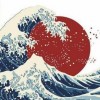- ベストアンサー
※ ChatGPTを利用し、要約された質問です(原文:there are times when...)
The Mysterious Stillness of the Sea
このQ&Aのポイント
- The sea is sometimes almost still, but even when it looks like glass, there are invisible waves.
- I have a question about the translation of the word 'though' in the sentence.
- If it is connected to the previous phrase 'there are times when the sea...,' it doesn't make sense.
- みんなの回答 (3)
- 専門家の回答
質問者が選んだベストアンサー
though ~の部分は従属節なので、本来は日本語的には 「~確かではあるが、海がほとんど静止している時がある」 と後ろから訳すことになるのですが、特にコンマがある場合は英語通り前から訳した方がいいです。 「海がほとんど静止している時はある、海が鏡のように見える時でも小さすぎて我々の目には見えない波があることは確かではあるが」 ただ、日本語で不自然になり、どちらにとっても逆接的なので、 「海がほとんど静止している時はあるが、海が鏡のように見える時でも小さすぎて我々の目には見えない波があることは確かではある」 としてしまっても通じます。まるで , but であるかのように。 しかし、そうすることをためらって、ぎりぎりの訳が「ただ」なんでしょう。 実際、こういう後ろにコンマがつく、, though ~というのは追加的に「~なんだけれどもね」 という感じで、従属節である通り、従属的なものです。 そういう意味で「ただ」という訳でふさわしいように思います。
その他の回答 (2)
- princelilac
- ベストアンサー率24% (1619/6638)
回答No.2
海が鏡のように見えるとき『でも』の部分にあます。ただし even の訳とくっついてしまっています。
- KappNets
- ベストアンサー率27% (1557/5688)
回答No.1
「ただ、」が though に対応しています。英語の接続詞 (however, also, ...) は日本語の接続詞と一対一対応させようとすると不自然な日本分になることもあり、意訳することがしばしばです。













お礼
よく分かりました。ありがとうございました。